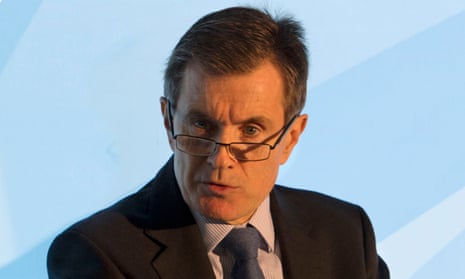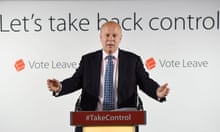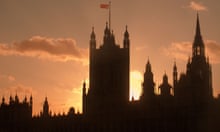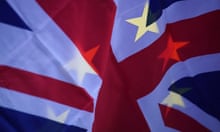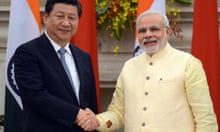Brexit is set to cause a loss of UK influence on a par with the 1970s, requiring a national assessment of how the UK’s future standing can be recovered once Brexit is complete, Sir John Sawers, the former head of MI6, has warned.
Speaking to the foreign affairs select committee, Sawers said: “We can see the trend of the coming years and we do not want to go through a repeat of the 1970s where the UK went progressively downhill compared to our national partners. We will need to turn it around. I am not sure how we are going to do it.”
Calling for an urgent reprioritisation of resources post-Brexit, he said: “We have to recognise a pretty stark reality faces us at the end of this process, and we have to rebuild from that.”
Accused by the Conservative MP Nusrat Ghani of providing only “gloom and doom” about Brexit, Sawers hit back, saying: “We have to acknowledge that Brexit is damaging our economy at the moment. Immediately after Brexit we suffered a 15% devaluation in our currency – we devalued all the assets in the UK by 15%. We are going through a Brexit inflation at the moment which means that people’s pay rises are not enough to keep up with real-terms incomes and, having 18 months ago been at the top of the G7 table of GDP growth performance, we are now at the bottom, so we are undoubtedly going through a bit of a dive. At the end of this process we will need to work out how to rebuild our economy and our influence in the world.”
Quick GuideWhat are Brexit options now? Four scenarios
Show
Staying in the single market and customs union
The UK could sign up to all the EU’s rules and regulations, staying in the single market – which provides free movement of goods, services and people – and the customs union, in which EU members agree tariffs on external states. Freedom of movement would continue and the UK would keep paying into the Brussels pot. We would continue to have unfettered access to EU trade, but the pledge to “take back control” of laws, borders and money would not have been fulfilled. This is an unlikely outcome and one that may be possible only by reversing the Brexit decision, after a second referendum or election.
The Norway model
Britain could follow Norway, which is in the single market, is subject to freedom of movement rules and pays a fee to Brussels – but is outside the customs union. That combination would tie Britain to EU regulations but allow it to sign trade deals of its own. A “Norway-minus” deal is more likely. That would see the UK leave the single market and customs union and end free movement of people. But Britain would align its rules and regulations with Brussels, hoping this would allow a greater degree of market access. The UK would still be subject to EU rules.
The Canada deal
A comprehensive trade deal like the one handed to Canada would help British traders, as it would lower or eliminate tariffs. But there would be little on offer for the UK services industry. It is a bad outcome for financial services. Such a deal would leave Britain free to diverge from EU rules and regulations but that in turn would lead to border checks and the rise of other “non-tariff barriers” to trade. It would leave Britain free to forge new trade deals with other nations. Many in Brussels see this as a likely outcome, based on Theresa May’s direction so far.
No deal
Britain leaves with no trade deal, meaning that all trade is governed by World Trade Organization rules. Tariffs would be high, queues at the border long and the Irish border issue severe. In the short term, British aircraft might be unable to fly to some European destinations. The UK would quickly need to establish bilateral agreements to deal with the consequences, but the country would be free to take whatever future direction it wishes. It may need to deregulate to attract international business – a very different future and a lot of disruption.
He added: “For the last 25 years our foreign policy has been closely tied up with working closely with our international partners, especially France and Germany.” At the same time, he said, the US had become a less reliable partner, “making the international system less effective than in the past” .
He said Brexit meant the UK would suffer “a double loss” at the UN since it would not be able to shape the influential common EU policy in New York or be able to rely on EU support at the general assembly.
Sawers called for more funding for security services after Brexit, saying: “It will be vital that we sustain, in many ways enhance, our investments in diplomacy, defence, intelligence – very high investments are made already – if we want to have an influence in the world of the sort we have had over the last 30 or 40 years.”
Sawers was giving evidence about the UK’s failure to win a vote at the UN general assembly to secure a seat for the British candidate on the international court of justice (ICJ), even though the seat was normally seen as reserved for a member of the EU. The seat instead went to an Indian judge, possibly reflecting a loss of general authority for the five permanent members of the security council.
The defeat has been seen as a symbol of a wider loss of UK influence at the UN in the wake of Brexit.
Sawers, a former UK ambassador to the UN, said he was surprised by the British defeat, adding that the distraction of the UK political class by Brexit may have contributed. Referring to the prime minister, he said: “She is not able to play the same international role in the world as the French president has in the past six months. That is just a reality.”
Another former UK ambassador to the UN, Lord Hannay, said some had spotted the UK’s decline in influence like a shark spots blood in the water. He added: “The trepidation index, when people mind if they trample on our toes, has gone down.” He said it was vital campaigns to win elections such at the one for the ICJ were begun as long as a year before the poll started, adding that efforts by the foreign secretary, Boris Johnson, to win the poll had come too late.
He warned that in future automatic EU solidarity over issues such as the Falklands might not be forthcoming. The EU surprised Argentina by imposing sanctions following the Falklands invasion. Hannay said: “The EU solidarity issue is now in play and I am afraid we will lose it.”
